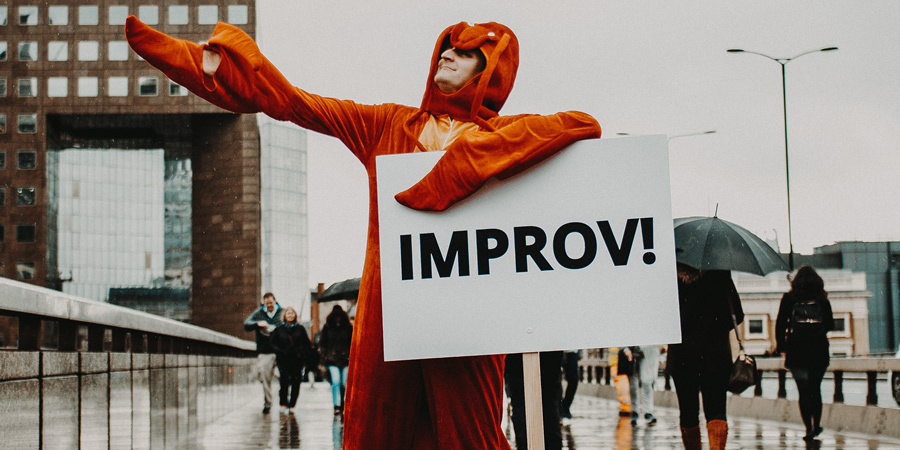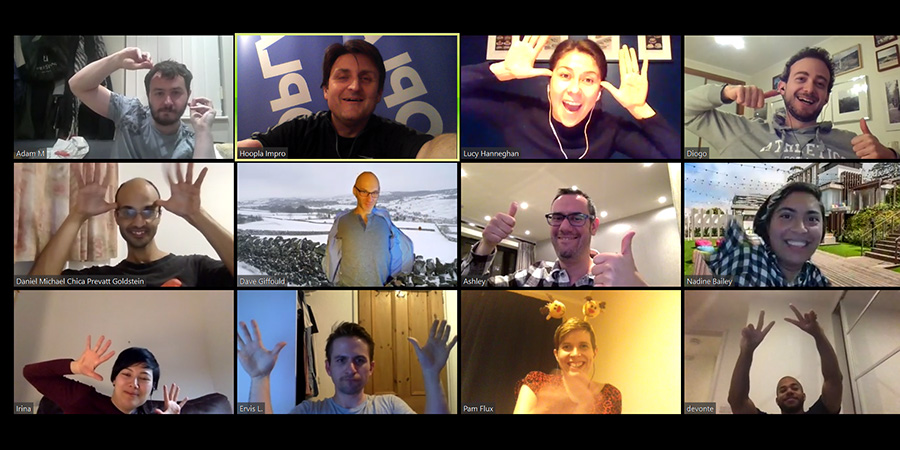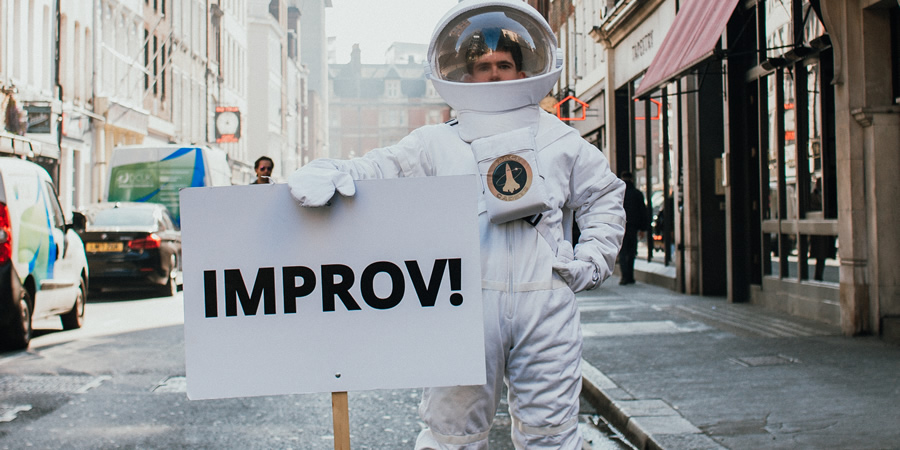Improv courses move online

The coronavirus lock-in has put a stop to many things, but it turns out improv comedy classes haven't been held back... they're now thriving online!
We chatted to Hoopla company director Steve Roe to hear how they've successfully jumped over to the Zoom video calling app. Along the way we also hear from Liz Peters from The Maydays and Jules Munns from The Nursery, who are also conducting improv sessions online...
Hi Steve. You've decided to move your courses online?
Yes, Hoopla along with our friends The Maydays and The Nursery have all moved our improv courses online during lockdown, and will probably keep an online option going after lockdown too.
We were thinking of just going into hibernation during lockdown. Then I thought Hoopla was dead and I better get a new job, but I can't imagine doing anything else other than improv. So, we spent last week experimenting with zoom and various other online platforms and found that a lot of improv still works online! Our students were keen to keep going, they are a sociable bunch, so online improv was born!
Jules from The Nursery: Following the immediate panic of watching our livelihoods disappearing overnight, we pulled our socks up and said [insert rousing orchestral underscore here!], "Hey, we are improvisers. Our ethos is 'Yes And...'! Adaptation is our craft. Nothing is a mistake, everything is a gift. This - where the ground changes under your feet, everything is uncertain and a curveball whacks you in the face - this is what we have been training for."
Tell us more about how an improv class works online...

It's really fun. Before the class you get emailed a link to a zoom chat, which is a kind of multi-person video chat room. There's around 10 people there and a teacher (me or someone else from Hoopla). We start with some getting-to-know-you games before going through fundamentals of improv like listening, 'yes and...' (collaboration) and saying the first thing that comes to you.
We then play loads of games that you would usually see on stage but we have designed for online, such as DJs hosting a radio phone in, a film being dubbed by different actors, and even entirely improvised multi-channel version of Netflix.
What are your aims of the course?
Most of all, it is to have a break from other worries for a couple of hours and have a massive laugh! Nobody wants to be in lockdown, but we are going to make the most of it while we are.

What sort of people are online improv courses for?
It's pretty much anyone that wants to have a laugh and do something sociable during lockdown. We get everyone at Hoopla. Last night we had a nurse wanting to have fun at the end of his hospital shift, someone phoning in from Portugal, a professional actress and a stand-up comedian. Some will be using it to keep practicing professional performing skills, some will be using it to have a laugh and take a break from other stresses and worries. Improv is for everyone.
Liz from The Maydays: As the world begins to isolate, the need for human connection is greater than ever! They're calling it 'social distancing' right now. Let's change that terminology to 'physical distancing'. We are and always will be social animals; connection is part of our survival and last night proved that it is still very possible and still very fun. So come and join the ride.
How have the first few Zoom sessions gone?
They've been going really well and are actually really good fun. In fact, all of Hoopla's, The Mayday's and The Nursery's online improv sessions for this week sold out in advance so we are all expanding what we do next week. There's a lot of people sat at home in the evenings right now without much do, and improv is giving them a healthy and sociable creative outlet.
Jules: There was some clunks and some grinds as we adjusted to the technology, of course. Games had to be adjusted to work with the time lag and spatial differences; some experiments worked better than others. But the most important thing is it did work. People laughed; people played. Scenes happened between peeps who were miles apart - we had Oliver Twist meeting the Devil, and a burglar with a penchant for interior design - and the players got a round of applause from far and wide.
Liz: After spending 2 hours laughing and playing with other human beings, I felt so good. We moved, we messed about, we escaped. And there was something so invigorating about connecting with the improv nuts that joined me for the adventure. All human beings in their own homes, who are all going through their own experience of this collective crazy world shit. All yes-anding the craziness and being willing to give it a go.

What are the main challenges/issues?
The main challenge is it feels a lot more awkward at the start of the session than a real-life session. In a real session there would be handshakes (remember those?), introductions, small talk, and snacks and drinks as people arrive, so people would break the ice before the session even starts. We've now worked out how to recreate a lot of that on Zoom and make use of things like breakout rooms to help people chat and get to know each other and break the ice. Then by playing a sequence of well-designed warmups we've found the group bonds and by half way through some really amazing things happen - before you know it you are laughing like mad in your living room!
A lot of the fun actually comes from not adapting and attempting to still do physical scenes with lots of interaction. For instance, yesterday I had two different students in separate houses pretending to be on the same rollercoaster together, leaning the same direction and screaming at the same time.
One positive is this is a chance for people not near your venue to actually interact with you for the first time? Might you continue with the idea, even when the venue is back open?

Yes. I think there was a gradual move to additional online learning anyway in the training industry. I think people were less inclined for instance to give up one year of work to do an MBA in a different town, but more inclined to find specific training that could fit in around their work in clever ways. I think this pandemic has accelerated that trend.
I don't think online will replace real work training, but it will run alongside it. In addition to our drop-ins we are creating long-term online training that will be up on our website forever more. This gives us the chance to genuinely bring improv to everyone, not just our local London audience. We had someone from Portugal and someone from Canada in last night's session. We wouldn't have been able to reach them without it and I like the idea of people coming together internationally through improv.
You can find out about Hoopla's online improv drop-in workshops via hooplaimpro.com
This article is provided for free as part of BCG Pro.
Subscribe now for exclusive features, insight, learning materials, opportunities and other tools for the British comedy industry.

